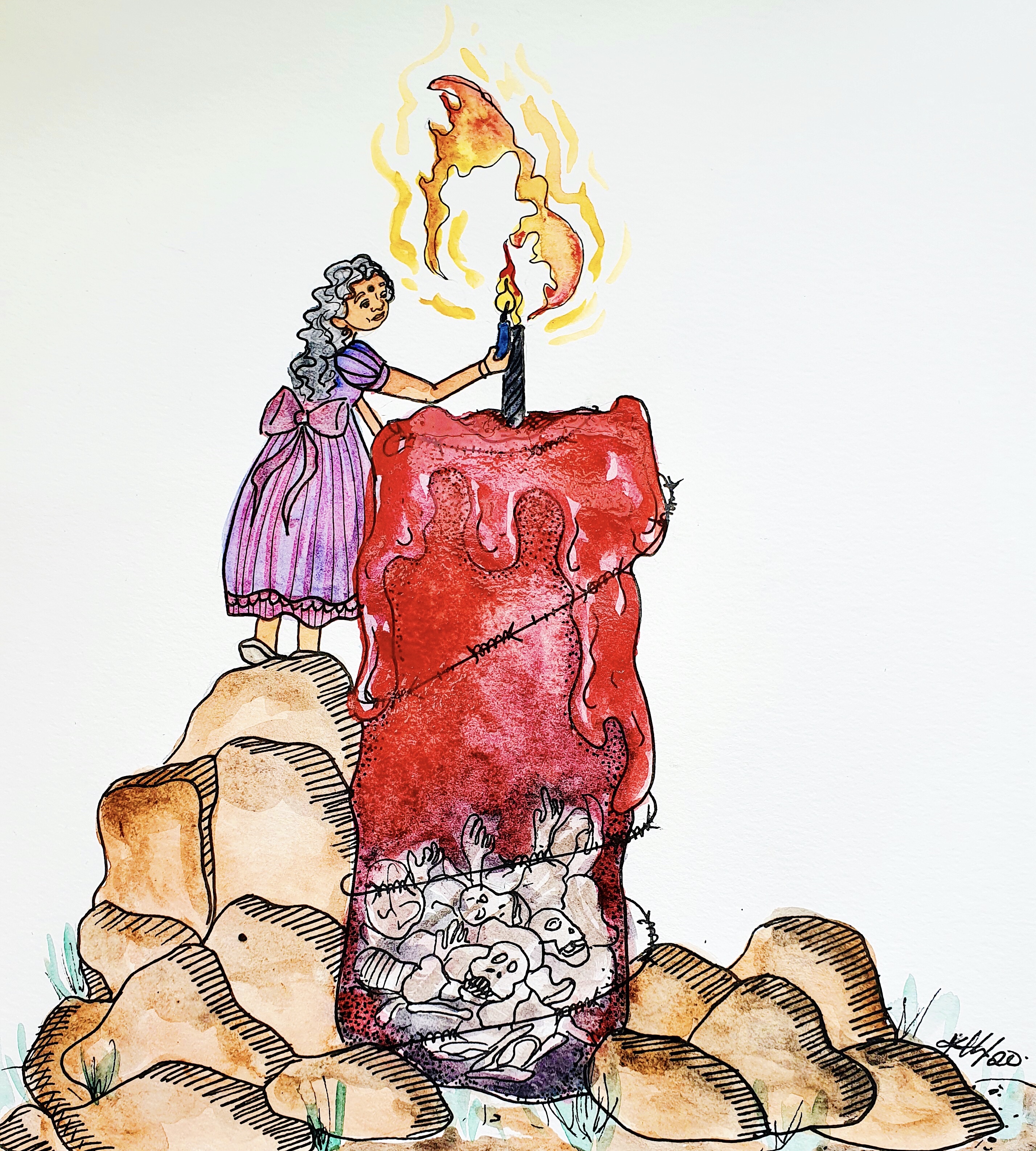
Illustration by Keera Ratnam/ waves of colour
In his Independence Day address, Sri Lanka’s President Ranil Wickremesinghe swore that he would oppose a “division of the nation” and put forward the prospect of “maximum devolution within a unitary state”. The statement comes as the latest attempt to dilute and dissuade Tamils from their calls for self-determination.
During his address to the All-Party Parliamentary Conference, Wickremesinghe warned that the decades-old 13th amendment must either be adopted or abolished. Yet, whilst these proceedings unfolded, across the North- East Eelam Tamils took to the streets, raising red and yellow flags, a symbol of the Eelam Tamil nation, in rejection of Wickremesinghe’s ultimatum.
In Jaffna, businesses closed their doors as part of a day-long hartal in support of demonstrators. In Mullaitivu, demonstrators called for the immediate demilitarisation of the Tamil homeland, in one of the most heavily militarised regions in the world. And from Kilinochchi to Batticaloa, protesters raised black flags and wore black headbands calling for an end to the occupation of the homeland by the Sri Lankan state. They continue to do so despite the ongoing military surveillance and police harassment. Sri Lanka’s police has already summoned the organisers of the protest for questioning under spurious allegations.
Wickremesinghe’s call to revive the 13th amendment, which was introduced as part of the 1987 Indo-Lanka Accord, has been met with a predictable response of backlash from Sinhala Buddhist nationalists and the Buddhist clergy. Members of the Freedom People’s Alliance (FPA) claimed they would oppose its implementation, “even at the expense of their lives”. Yet, notably the Rajapaksa’s and their allies, who openly campaigned against devolution have seemingly thrown their weight behind Wickremesinghe’s plan.
Tamils, however, refuse to fall in line and have recognised discussions of the 13th amendment as a red herring. In the aftermath of the armed conflict, which saw the slaughter of tens of thousands of Tamil civilians, international pressure mounted on the Mahinda Rajapaksa administration to resolve the decades-old ethnic grievances of Tamils and find a sustainable peace. To deflect this mounting pressure, Mahinda Rajapaksa turned to the 13th Amendment and even claimed he would go beyond its provisions to allow for greater devolution to the provincial councils. This promise was swiftly abandoned to placate the demands of Sinhala nationalists however it has been an effective means of distracting the international community; a tool Sinhala politicians have often harnessed.
Despite the rhetoric, there is a widespread acknowledgment amongst Tamil politicians that the Wickremesinghe administration is not distinct from the governments which came before it. In the face of his outlandish claims that he would bring a resolution to aspiration for self-governance, Tamils knew all too well who Wickremesinghe is. Whilst attempting to present himself as a moderate, he is indistinguishable from successive Sinhala leaders who have shown themselves subservient to the demands of Sinhala Buddhist nationalists and the island’s military-industrial complex.
Instead of accepting the ultimatum put before them by Colombo, Tamils across the homeland and the global diaspora are continuing their longstanding demand for self-determination through a federal structure and the dismantling of Sri Lanka’s unitary state. There is a recognition that the dysfunctional nature of politics on the island will not deliver justice; hence Tamils have called for an international accountability mechanism. Rather than accept the Sri Lankan president’s ultimatum, Tamils continue to forge an alternative to the binary politics of Colombo.
We need your support
Sri Lanka is one of the most dangerous places in the world to be a journalist. Tamil journalists are particularly at threat, with at least 41 media workers known to have been killed by the Sri Lankan state or its paramilitaries during and after the armed conflict.
Despite the risks, our team on the ground remain committed to providing detailed and accurate reporting of developments in the Tamil homeland, across the island and around the world, as well as providing expert analysis and insight from the Tamil point of view
We need your support in keeping our journalism going. Support our work today.
For more ways to donate visit https://donate.tamilguardian.com.

